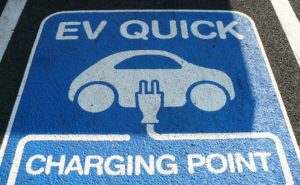 Electric vehicles (EVs) are starting to revolutionize the car market in 2018, with BMW recently announcing new designs for electric versions of a dozen of its leading models. The BMW effort is being replicated across the car market by its competitors, as technological advances transform vehicle designs in the biggest shift to hit ground transport since the invention of the internal combustion engine. Even roads are changing with the gradual arrival of the energy generating and storing “solar panel roads.” These new EVs come with one drawback from carmakers’ perspectives however; they require a great deal of the rare mineral cobalt. A typical EV battery needs 21kg of cobalt to function properly, and as the mining sector has woken up to the prospect of fleets of EVs on our roads by the 2020s, the price of cobalt has spiked.
Electric vehicles (EVs) are starting to revolutionize the car market in 2018, with BMW recently announcing new designs for electric versions of a dozen of its leading models. The BMW effort is being replicated across the car market by its competitors, as technological advances transform vehicle designs in the biggest shift to hit ground transport since the invention of the internal combustion engine. Even roads are changing with the gradual arrival of the energy generating and storing “solar panel roads.” These new EVs come with one drawback from carmakers’ perspectives however; they require a great deal of the rare mineral cobalt. A typical EV battery needs 21kg of cobalt to function properly, and as the mining sector has woken up to the prospect of fleets of EVs on our roads by the 2020s, the price of cobalt has spiked.
Early in January, business outlet Bloomberg reported the price had climbed from $600 to $1700 in 16 months. There is another problem for carmakers however: 60 percent of all known cobalt supplies come from the unstable and corrupt Democratic Republic of Congo (DRC). War is also brewing there after the DRC’s autocratic leader President Joseph Kabila refused to step down at the end of his term in 2016. With fossil fuels falling out of favor due to their environmental impact, carmakers do not have the luxury of refusing to engage with the DRC, but how they avoid tying themselves too tightly to the decaying Kabila regime will be a crucial consideration. In the interim period between the end of fossil fuels’ monopoly of the motor industry and the rise of credible alternatives to cobalt (recycling dead batteries is often mentioned), the DRC will have a disproportionate amount of international leverage relative to its tiny and highly dysfunctional economy.
Background
A legacy of dictatorship. Security in the DRC has taken a sharp downwards turn in 2017 as the peace agreement which ended the devastating Second Congo War in 2003 fell apart. President Joseph Kabila, who took over as the DRC’s leader upon the assassination of his father Laurent-Désiré Kabila, went on to serve two full terms as the “elected” leader of the DRC. This was all that was allowed him under the post-war DRC constitution, whose creators wanted to avoid another ‘president-for-life’ in the mold of the DRC’s notorious former military dictator Mobutu Sese Seko. Mobutu was leader when rebel forces under Laurent-Désiré Kabila took power 1997. He had helped to murder the DRC’s first prime minister, Patrice Lumumba, by turning him over to secessionist forces in the rebelling state of Katanga, who promptly had Lumumba shot. He also overthrew the DRC’s first president, Joseph Kasavubu, in 1965.
Corruption in the DRC. This tradition of coups, assassinations, and violent rebellion has plagued the DRC ever since. Joseph Kabila’s refusal to step down at the end of his final term in 2016 has sparked violent conflict in both the Congo’s southwestern Kasai region and in the DRC’s unstable east. While fear of his own personal safety is undoubtedly one reason that Kabila has repeatedly pushed back elections (he now says they will take place in December 2018, two years after his term officially ends), corruption is another. Kabila and his circle are estimated to have amassed a considerable fortune during his brutal 17-year reign, such that there is no sector in the DRC’s economy which is free from their influence — including the lucrative mining sector.
Impact
Acquiring cobalt from the DRC is therefore a PR nightmare for leading Western carmakers and their developed democratic equivalents in states like Japan and South Korea. For starters they are dealing with a country where the central leadership is facing outbreaks of political dissent in the periphery, and the capital only survives through brute force and playing the opposition off against each other.
The national environment is not a place for safe and stable business arrangements. Conversely it is an excellent one for becoming identified with the regime of an authoritarian despot, risking brand damage over the regime’s human rights record and complications dealing with whatever government succeeds Kabila.
Then there are concerns about just who is operating at the far end of the supply chain where the raw materials are extracted. Carmakers are already exploring the possibilities of sourcing some of their products from the DRC’s inefficient artisanal mines, which still produce around a fifth of cobalt exports. The approach is problematic because the artisanal mines frequently employ child labor, they have been linked to forced labor and militant groups in the recent past, and they are corruptly awarded their mining licenses, if they’re licensed at all. Meanwhile seven of the 10 largest producers in Congo as of 2016 were Chinese-owned according to Bloomberg. These companies operate in a far looser regulatory environment, and as a result have a reputation for condoning terrible work conditions, environmental destruction, and for working hand-in-glove with corrupt rebel warlords, dictators, and organized criminal syndicates.
